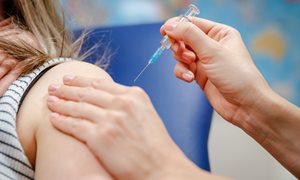
Gerdine Fransen-Kuppens has been appointed professor by special appointment of Population-based Prevention at Radboud university medical center / Radboud University. This chair is funded by the GGD Gelderland-Zuid. Fransen-Kuppens combines her practical experience of prevention with science, and investigates how prevention policy can be improved.
Abolish the VAT on fruit and vegetables. Offer healthy food in canteens. Build better walking and cycling paths. Create a smoke-free campus. All examples of policy that makes healthier choices easier. Gerdine Fransen-Kuppens investigates how municipalities can improve their health policy and what they can do to make healthy choices more attractive. Especially for people in a disadvantaged situation, for example due to poverty. This should reduce health inequalities and reduce the pressure on healthcare.
Fransen-Kuppens has been working at GGD Gelderland-Zuid for years. There she leads a team of health advisors and researchers who advise the municipalities on health policy. For example about smoking, alcohol, obesity and loneliness. And in particular how to reach the people who need help the most. She therefore has extensive experience in the public domain.
Neighborhood sports
With her part-time appointment as a professor at Radboudumc, she wants to bridge the gap with the health domain. Fransen-Kuppens: ‘It is precisely the vulnerable groups that benefit most from prevention that are difficult to reach for the municipality and the GGD. We know that these people often live in unhealthier neighborhoods with unhealthier working conditions. They have less chance on health and a healthy lifestyle. That is why they more often visit the doctor and the hospital. So we can easily reach them there.’
But there is still a big challenge. ‘Referrals are well organized between care providers’, explains Fransen-Kuppens. ‘But how can we refer vulnerable groups from the healthcare provider to, for example, a coach in the field of neighborhood sports, lifestyle or well-being? That is much less clear.’ The various parties in the healthcare sector and in the public sector therefore need to be able to find each other better.
Flow
Prevention is becoming increasingly important. ‘We must do something about the increasing pressure on healthcare. We realize that health education alone, which we often used in the past, is not sufficient for effective prevention’, Fransen-Kuppens explains. ‘We have to work on system change with smart policy. Look at smoking, for example: in the past, the glasses with cigarettes were on the table on a birthday party. The number of smokers has now decreased drastically, thanks to decades of policy that discourages smoking, with an increase in VAT, more smoke-free places and support to stop smoking in the health insurance.'
The chair therefore fits in well with the ambitions of the Ministry of Health, Welfare and Sport, which is fully committed to prevention. Fransen-Kuppens: ‘If we want to make a difference, it is important that we tackle health problems such as obesity together with all parties. There is a lot of knowledge in the Netherlands, but that should flow even more. I want to bring together and strengthen science, practice and effective policy.’
Career
Gerdine Fransen-Kuppens studied Health Sciences at Maastricht University and obtained her PhD for her dissertation entitled: Dyspepsia in primary care: patient expectations, symptoms and treatment adherence. She then worked at Radboudumc, WUR and the Netherlands Institute for Health Promotion and Disease Prevention (NIGZ). Since 2009 she has been team manager at GGD Gelderland-Zuid and works at the academic workplace public health AMPHI on research in the field of Integrated Health Policy. AMPHI is a collaboration between several GGDs and the Department of Primary Care at Radboud university medical center.
Fransen-Kuppens is project leader of a national project with all academic workplaces Public Health in the Netherlands, VWS, RIVM and other organizations, to strengthen the knowledge infrastructure for Health Promotion and Prevention in the Netherlands. In addition, Fransen-Kuppens is a member of the Green, Healthy and in Movement steering group in Nijmegen, a member of the prevention team at Radboud university medical center and chairman of the Network for Healthy Neighborhoods in Rijk van Nijmegen.
The appointment as professor by special appointment takes effect on 1 July for a period of 3 years and is financed by GGD Gelderland-Zuid. GGD Gelderland-Zuid supports 14 municipalities with advice and action, and thus protects, monitors and promotes the health of their inhabitants.
-
Want to know more about these subjects? Click on the buttons below for more news.
More information
Annemarie Eek

wetenschapsvoorlichter






